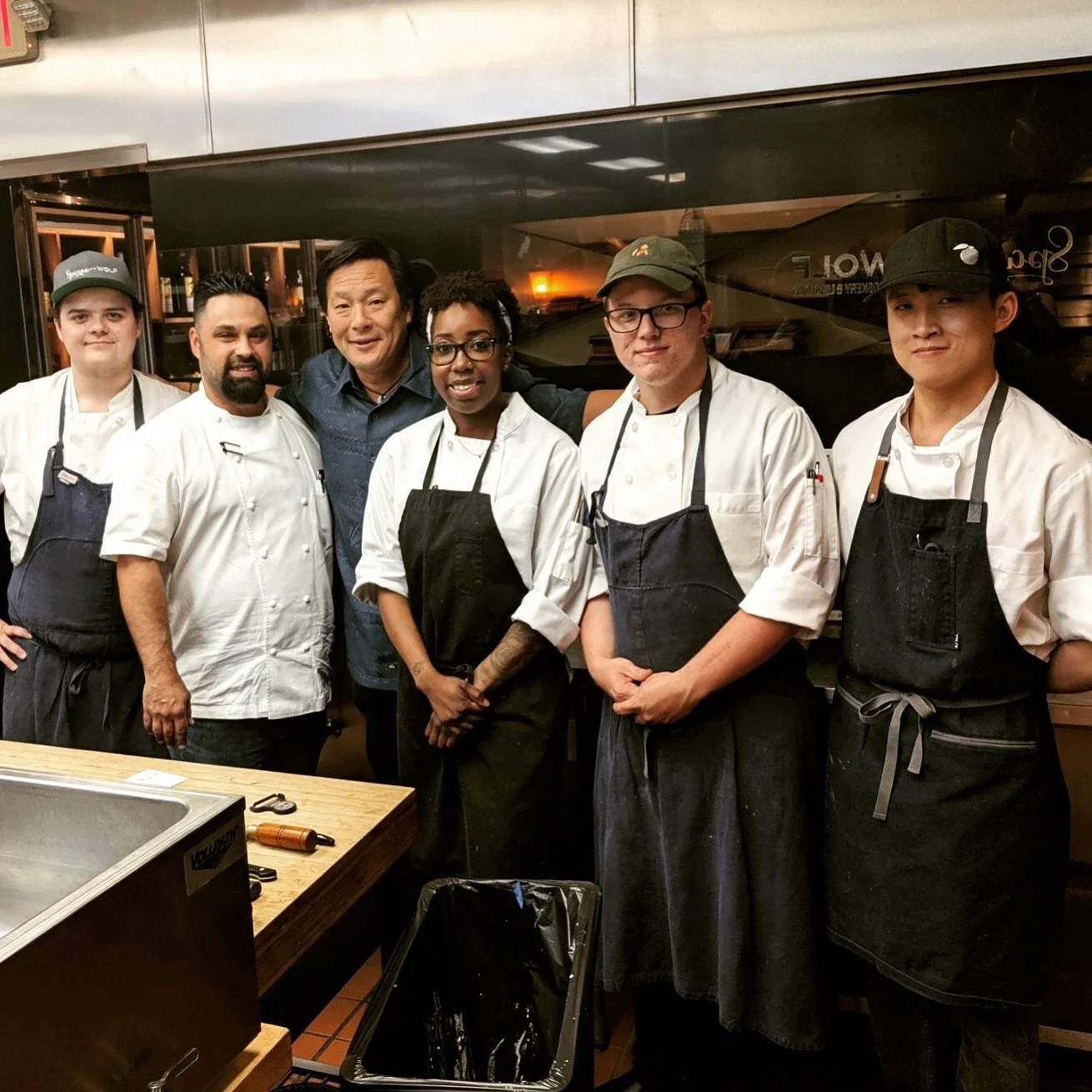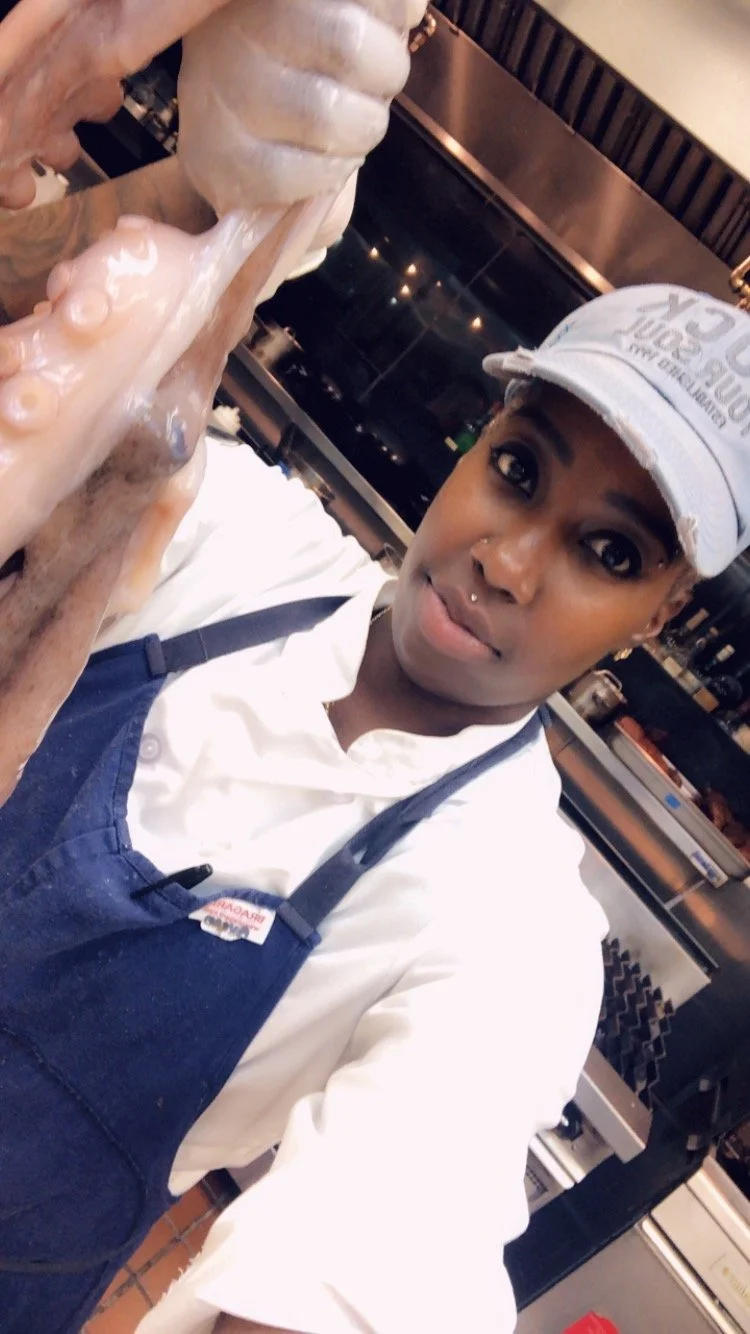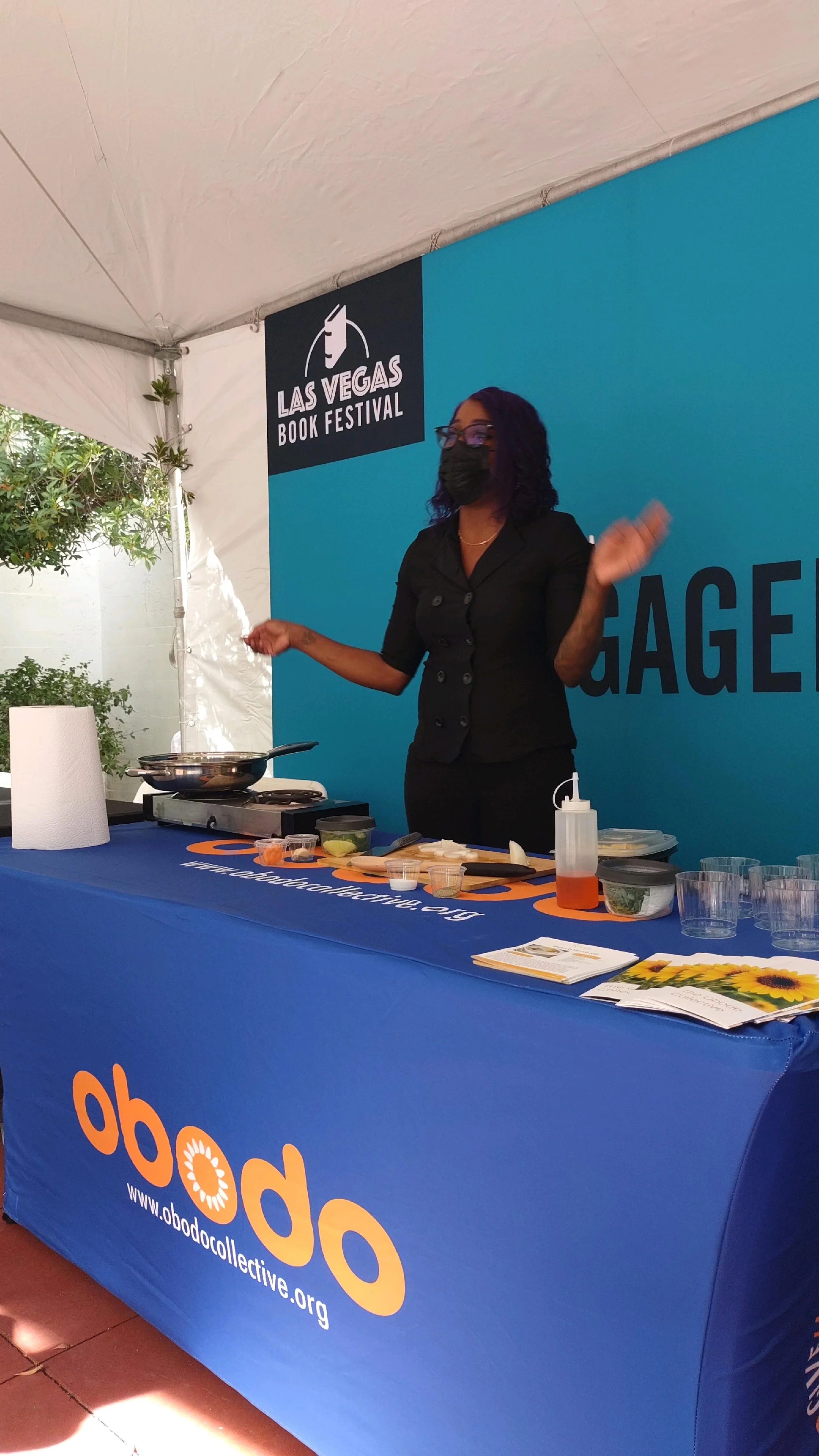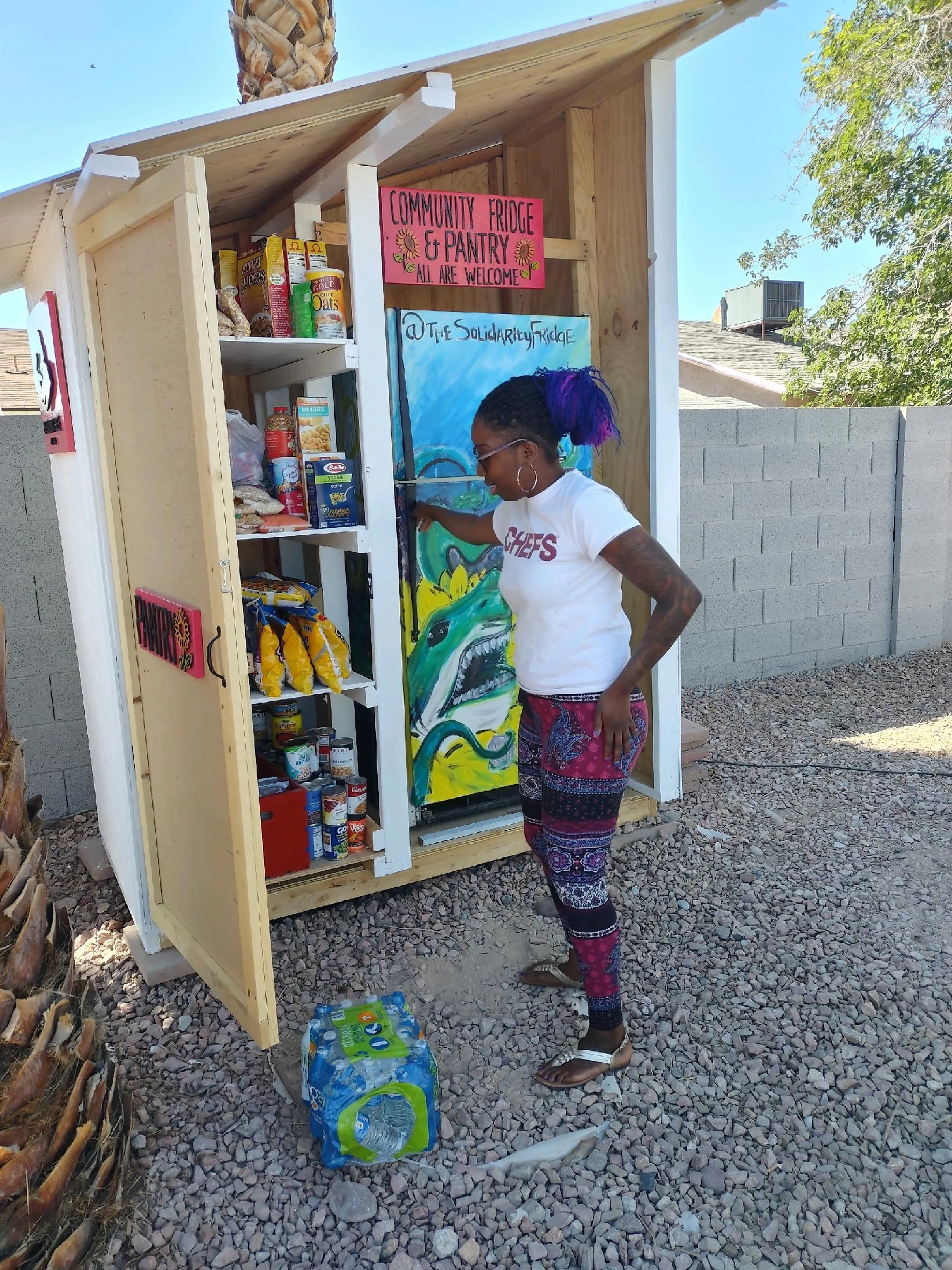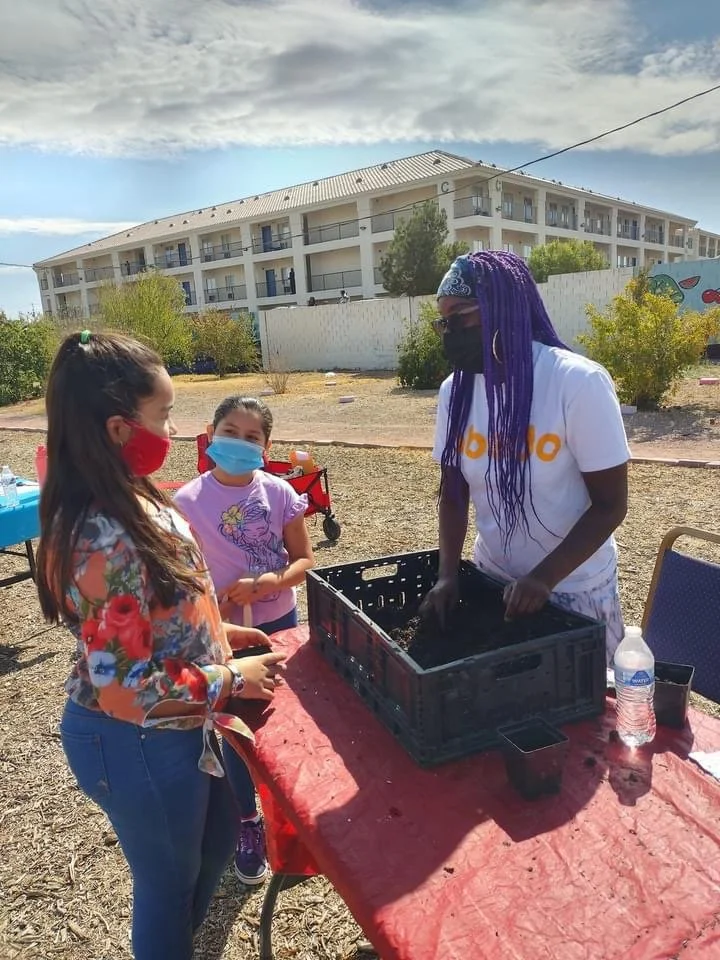The Hands That Guide The Harvest
On any given day along C Street and Monroe, you’ll see a royal purple crown carefully planting seasonal seedlings into a handmade garden box—a labor of love and artistry.
Cheyenne approaches the land with intention, dissecting the soil, reading the sun, and honoring the water, each act a brushstroke on her living canvas.
The canvas she paints was ancestrally stretched over four wooden frames and secured by her grandmothers' hands.
Where It All Started
Both grandmothers on each side are the roots that have grown her love for food.
Cheyenne’s maternal grandmother was known for often selling out of her homemade meals. But one meal that stood out above the rest for Cheyenne was her tamales.
“She just did it in a way nobody else did it. I loved her tamales. She would put a whole chicken leg in her tamale… You're like, you got the bone in there. It was so good. I want that tamale. That's what I know. That's what I love.” says Cheyenne.
With her Belizean lineage, she recalls her great-great-grandmother was also a grower of herbs and possibly some hot peppers—a staple of Belizean cuisine. For them, tending the land was a family tradition, one centered on nourishment, not profit.
On her father’s side, her grandmother left a lasting impression with this dinner table habit:
“So no matter what we ate for dinner, we'd always have a salad on the table. And that was one of those things that I practice to this day… it don't matter what we eat. Even when we have pizza… I'm gonna make a little salad to go with this pizza. And she [my grandmother] would do really, really fancy hotel salads.”
Behind The Strips’ Glitter & Gold
Cheyenne's culinary journey began at an early age, driven by a deep love and curiosity for food. This passion led her to pursue and graduate from culinary arts school, where she honed her skills and expanded her knowledge of the craft.
With Las Vegas being a food destination for many, Cheyenne naturally gravitated toward cooking on the Strip and rubbing elbows with some of the top chefs around the valley.
Yet, her experience on the Las Vegas Strip revealed a painful disparity:
“I could see how drastic the differences were… I needed to explain it. I didn't understand why all this food was over here [on the Strip], but none of it was over here [in the Westside]... I needed to understand what I was missing to make that make sense and understand why that was a reality,” she explained.
Her search for answers opened a new path—one where farming became her tool for creating lasting impact.
The Westside faces a harsh reality known as food apartheid—a systemic lack of access to fresh, healthy, and affordable food. According to a study by the City of Las Vegas, the neighborhood is short of five full-service grocery stores needed to meet the community’s needs.
Instead, residents are met with what some call “Cardiac Corner,” a cluster of fast-food chains, including Jack in the Box and McDonald’s, at the busy intersection of MLK Boulevard and Lake Mead Boulevard. This corner, infamous for its unhealthy options, reflects a deeper issue: communities of color are often flooded with high-fat, high-sodium convenience foods while fresh produce remains out of reach.
For many Westside residents, especially those without reliable transportation, these fast-food outlets become the default option, contributing to diet-related illnesses such as diabetes, heart disease, and high blood pressure. This “food desert” is not a coincidence—it's a consequence of disinvestment, redlining, and decades of structural neglect.
A Farm Grown From The People’s Palate
With a decade of farming experience and countless classes and certifications, Cheyenne now leads as the Food Program Coordinator at Obodo Urban Farm, right in the neighborhood that raised her.
Aiming to disrupt the neighborhood's vicious food cycle, The Obodo Urban Farm offers a unique approach with its ‘pay-what-you-can’ U-pick farmers’ markets.
The urban farm is affectionately known by the community for its seeded sugar baby watermelons, luscious collard greens, leafy bok choy, and beautiful red and green okra. Cheyenne has made it her mission to grow what the community asks for to ensure the farm reflects the cultural cuisine styles of the surrounding neighbors.
And the neighbors definitely take note of Obodo’s beautiful masterpiece.
“The community loves it… I think that one of the things that makes Obodo different is that we know their names, we know what schools their kids go to. And I think that that resonates so much more with them and a level of trust that they have with Obodo to be caretakers for this community and to watch out for them and support them. And it's, it's again, mutually beneficial. So they watch out for the farm and the grocer as well. You know, they are our number one line of defense.”
Growing A Resistance
So what’s the solution to reclaiming our food systems? It’s simple: Grow our own food.
Growing our own food is more than self-sufficiency; it’s resistance. It’s about reclaiming control of our health, choices, and futures. It’s about planting seeds with elders, teaching children to harvest, and passing down knowledge anchored in care and community.
“Prior to the industrialization of agriculture, 40% of all of our country's food was being produced in small gardens—in urban gardens and church gardens and patio gardens and backyard gardens,” says Cheyenne.
A stark statistic that proves we’ve become disconnected from being stewards of the land.
“So this is not a reimagining, it's a revival,” states Cheyenne.
She continues:
“We've done this… I like to remind people of that because I think it's kind of scary, the lack of familiarity that we do have with our food. It echoes the lack of familiarity with our bodies, with our communities, with just these systems that govern our lives… So I always start off by telling people… they're a whole lot smarter than they think they are. You know this, you know these things. It's just about re-remembering these things, you know what I mean?”
Being a carrier of light is never an easy thing, but Cheyenne and the Obodo Collective radiate adoration and care in a community that still feels the shockwaves of disinvestment and structural racism.
From Vision to Victory: The Opening of the Obodo Grocery Store
On February 22, 2025, The Obodo Collective will reach a major milestone with the grand opening of Obodo Grocery Store, a community-driven marketplace offering farm-fresh produce and locally sourced goods to the Westside and beyond. This long-awaited project—five years in the making—is more than a store; it’s a testament to perseverance, vision, and the power of community-led solutions.
With its shelves stocked from the hands of local farmers and artisans, Obodo Grocery Store will provide a vital resource in a neighborhood long underserved by traditional grocers, furthering The Obodo Collective’s mission to nourish, empower, and uplift neighbors out of poverty.
With this amazing accomplishment under her belt, Chey is on the path to living out her wildest agriculture dreams.
“Oh, my wildest farmer dreams, which I completely plan on bringing to fruition, is to be one of the largest producers in the state to continue to help build micro food systems all throughout Southern Nevada. Because I did work on the Strip during the pandemic, and I know I've seen firsthand the lack of resilience that we have and our continued dependence, which also means that we have to be compliant to a lot of things that we don't necessarily want nor agree with because we don't have any leverage.”
She continues:
“So those are some of the goals. But also, I want to be the largest Black-owned farm in the state of Nevada. You know, that's one of the goals. So your girl is over here talking about thousands and thousands of acres of innovative, cutting-edge farm production where we are honoring nature, we are honoring our ancestors, we are honoring our resources, and we are doing it all together. So that would be the big end-all, be-all—me retiring on a porch somewhere, looking like Jody’s mama with my little cup of tomatoes.”
A Master Gardener and Artist
Cheyenne, the artist, and her canvas: a farm painted with roots, wisdom, and dreams. Each seed is a brushstroke, weaving past, present, and future. Guided by her grandmothers, who taught her the language of food—from tamales to garden greens—she honors their legacy in every bloom.
But her canvas reaches beyond the soil. With every seed sown, Cheyenne nurtures connection, culture, and care. Her farm is more than a source of nourishment; it is a space for gathering, learning, and healing.
The masterpiece unfolds, rooted in legacy, tended with love, and growing a future where food is abundant, justice is tangible, and her grandmothers' lessons live on.


